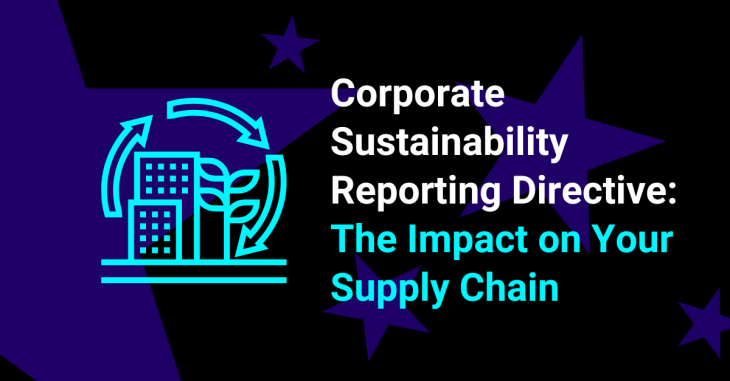Corporate Sustainability Reporting Directive (CSRD): The Impact on Your Supply Chain

What is CSRD?
The Corporate Sustainability Reporting Directive (CSRD) is a legislative mandate by the European Union. It has been enforced since January 5, 2023. It mandates all EU enterprises, including eligible subsidiaries of non-EU firms, to divulge their ecological and societal footprints. Additionally, it necessitates a thorough examination of how their environmental, social, and governance (ESG) endeavors intertwine with their business operations.
The Critical Role of Value Chains
Understanding environmental impact relies heavily on value chain dynamics. In large value chains, up to 80% of a company’s environmental footprint can stem from contributors beyond its direct operations.
Suppliers contribute upstream through material production, while downstream, consumer usage adds to the footprint, notably through energy consumption.
This CSRD framework emphasizes the crucial role of value chains in assessing carbon emissions and overall environmental impact. This requires precise data collection, moving beyond general assessments.
Supplier Product Footprints
The importance of gathering product footprints from suppliers is significant. In many large companies, supply chains are a major environmental factor, with certain suppliers known as “impact hotspots.” These suppliers play a critical role in both measuring a company’s footprint and facilitating sustainable improvements.
Under the CSRD’s new rules, it’s important environmental information from these impactful suppliers. This means they must ask their main suppliers to measure their products’ environmental impact. These measurements, called “product footprints,” will then be used in the company’s overall environmental assessments.
Supplier Sustainability Initiatives
Step 1: Assessing Environmental Footprint: Utilize GHG Protocol or Life Cycle Assessment (LCA) methodologies to comprehensively measure your company’s environmental impact. This includes identifying key suppliers that significantly contribute to your footprint.
Step 2: Collaborating with High-Impact Suppliers: Engage top-emitting suppliers to provide detailed LCAs, aligning with CSRD regulations and sustainability goals.
Essential Preparation Steps:
- Identify suppliers with substantial environmental impact.
- Explore collaborative opportunities to drive shared value.
- Establish robust data management protocols for efficient information exchange.
- Implement a structured supplier engagement and data collection program.
- Integrate supplier-provided data into your internal systems for informed decision-making and strategic sustainability planning.
Penalties for Breach
Penalties for breaching such regulations would typically depend on the specific provisions outlined in the directive itself and the laws of the respective EU member states implementing it. Penalties could include fines, sanctions, or other regulatory actions depending on the severity of the breach and the jurisdiction.
CSDDD vs. CSRD: A Comparison
Unlike the Corporate Sustainability Reporting Directive (CSRD), which emphasizes transparency and consistency in sustainability reporting, CSDDD shifts the focus towards ensuring that companies take active measures. To identify, prevent, and mitigate the adverse impacts of their operations on the environment and human rights, particularly within their supply chains. CSDDD mandates strong due diligence, requiring companies to assess and address environmental and social risks in their operations.
Optimizing CSRD Compliance with Rhythm Innovations
Rhythm Innovations provides a complete solution for EU Corporate Sustainability Due Diligence Directive (CSRD) compliance prep. Our platform simplifies third-party risk management, including ESG practices in your supply chain. Here’s how Rhythm Innovations can help:
- Easy Assessment and Tracking: Use Rhythm Innovations’ platform to quickly check how suppliers are doing with their eco-friendly practices.
- Risk Evaluation: Find out if suppliers might cause trouble for your company. Check their security, how they run their business, and how they treat the environment.
- Contract Compliance: Make sure your agreements with suppliers include rules about being eco-friendly. Our platform seamlessly merges contract lifecycle management with due diligence processes, ensuring regulatory compliance.
- Sort Suppliers Smartly: Put suppliers into different groups based on a risk ranking. This helps to identify which suppliers need more attention.
- Fix Problems Early: Spot and solve problems with how suppliers treat human rights and the environment. Our platform offers centralized risk management capabilities supported by streamlined workflows and remediation guidance.
- Simplified Reporting: Make it easy to share progress and results with key stakeholders.
- Keep Watch, Stay Safe: Always keep an eye on suppliers to catch any problems early.





